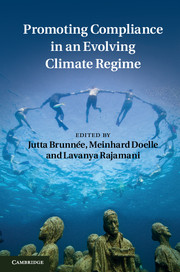Book contents
- Frontmatter
- Contents
- Contributors
- Preface
- Abbreviations
- Introduction: The role of compliance in an evolving climate regime
- Part I Context
- Part II The Kyoto compliance system: Features and experience
- Part III Compliance and the climate regime: Issues, options, and challenges
- 7 The role of non-state actors in climate compliance
- 8 Facilitation of compliance
- 9 Enforcing compliance in an evolving climate regime
- 10 Financial mechanisms under the climate regime
- 11 Post-2012 compliance and carbon markets
- 12 Compliance and the use of trade measures
- 13 ‘Comparability of efforts’ among developed country parties and the post-2012 compliance system
- 14 From the Kyoto compliance system to MRV
- 15 Compliance in transition countries
- 16 Developing countries and compliance in the climate regime
- 17 The role of dispute settlement in the climate regime
- 18 Depoliticizing compliance
- Part IV A look forward
- Bibliography
- Index
- References
14 - From the Kyoto compliance system to MRV
what is at stake for the European Union?
Published online by Cambridge University Press: 05 January 2012
- Frontmatter
- Contents
- Contributors
- Preface
- Abbreviations
- Introduction: The role of compliance in an evolving climate regime
- Part I Context
- Part II The Kyoto compliance system: Features and experience
- Part III Compliance and the climate regime: Issues, options, and challenges
- 7 The role of non-state actors in climate compliance
- 8 Facilitation of compliance
- 9 Enforcing compliance in an evolving climate regime
- 10 Financial mechanisms under the climate regime
- 11 Post-2012 compliance and carbon markets
- 12 Compliance and the use of trade measures
- 13 ‘Comparability of efforts’ among developed country parties and the post-2012 compliance system
- 14 From the Kyoto compliance system to MRV
- 15 Compliance in transition countries
- 16 Developing countries and compliance in the climate regime
- 17 The role of dispute settlement in the climate regime
- 18 Depoliticizing compliance
- Part IV A look forward
- Bibliography
- Index
- References
Summary
Introduction
The Kyoto Protocol compliance mechanism was designed to strengthen the protocol’s environmental integrity, ensure transparency of accounting by parties, and support the global carbon market’s credibility. Its objective is to ensure an effective implementation and enforcement of the protocol in accordance with international law, under the auspices of the Compliance Committee. Even if the current climate regime does not explicitly refer to measurement, reporting and verification (MRV) it does in fact contain important related requirements which provides parties with an implementing framework and, where appropriate, the necessary information to trigger the compliance mechanism.
In this context, MRV and compliance are different and should not be confused. MRV can help identify non-compliant situations through a technical procedure, whereas the compliance mechanism provides for a set of legal (and quasi-judicial) procedures to determine and address cases of non-compliance, through facilitative and enforcement measures, including punitive consequences. Both processes have proved to be complementary in ensuring an effective international climate regime.
- Type
- Chapter
- Information
- Promoting Compliance in an Evolving Climate Regime , pp. 317 - 338Publisher: Cambridge University PressPrint publication year: 2011



